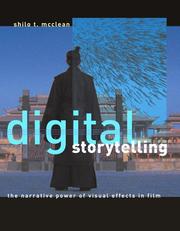| Listing 1 - 4 of 4 |
Sort by
|
Book
ISBN: 2212117612 9782212117615 Year: 2007 Publisher: Paris : Eyrolles,
Abstract | Keywords | Export | Availability | Bookmark
 Loading...
Loading...Choose an application
- Reference Manager
- EndNote
- RefWorks (Direct export to RefWorks)
Guide de référence à l'usage des scénaristes, des réalisateurs et plus largement de tous les cinéphiles. De Métropolis à Kill Bill, 100 exemples des outils proprement cinématographiques qui construisent l'histoire d'un film, accompagnés d'extraits des scénarios les plus célèbres montrant comment créer des caractères, dynamiser une action, etc., sans faire appel aux dialogues.
Motion pictures --- Narration (Rhetoric) --- Cinéma --- Narration --- Sémiologie --- Cinéma --- Scénario --- Mise en scène --- Storyboard --- Récit filmique --- Langage cinématographique --- Technique
Book
ISBN: 2744006874 Year: 1999 Publisher: Paris : CampusPress,
Abstract | Keywords | Export | Availability | Bookmark
 Loading...
Loading...Choose an application
- Reference Manager
- EndNote
- RefWorks (Direct export to RefWorks)
Computer graphics --- Computergrafiek --- HTML (Document markup language) --- Hyper Text Markup Language --- Infographie --- World Wide Web --- World Wide Web (Informatie-retrieval systeem) --- World Wide Web (Information retrieval system ) --- World Wide Web (Système de récupération des informations) --- Informatique graphique --- Typographie --- Storyboard --- Graphisme --- Traitement de l'image --- Internet --- Site web --- Image processing --- Digital techniques
Book
ISBN: 287340079X 9782873400798 Year: 1992 Publisher: Crisnée (Liège) : Yellow Now,
Abstract | Keywords | Export | Availability | Bookmark
 Loading...
Loading...Choose an application
- Reference Manager
- EndNote
- RefWorks (Direct export to RefWorks)
La colonne vertébrale de ce livre est constituée d'entretiens avec des cinéastes contemporains, réalisés lors d'une enquete approfondie sur les multiples applications du storyboard.
Catalogues d'expositions --- Films --- Films cinématographiques --- Tentoonstellingscatalogi --- Cinematography --- Motion picture producers and directors --- Motion pictures and the arts --- Cinéma --- Producteurs et réalisateurs de cinéma --- Cinéma et arts --- Interviews --- Entretiens --- Illustration film --- Storyboard --- Cinéma --- Producteurs et réalisateurs de cinéma --- Cinéma et arts --- Motion pictures --- Comic books, strips, etc --- CDL --- 791.42 --- Comic strips --- Comics --- Funnies --- Manga (Comic books, strips, etc.) --- Manhua (Comic books, strips, etc.) --- Manhwa (Comic books, strips, etc.) --- Serial picture books --- Caricatures and cartoons --- Wit and humor, Pictorial --- Cinema --- Feature films --- Movies --- Moving-pictures --- Audio-visual materials --- Mass media --- Performing arts --- Motion picture plays --- Motion picture plots --- Plots (Drama, novel, etc.) --- Film genres --- Plots, themes, etc --- History --- History and criticism --- Themes, motives --- Manhua (Comic books) --- Manhwa (Comic books) --- Scénarimages --- Scénarios --- Thèmes, motifs

ISBN: 0262134659 9780262134651 0262633698 9780262633697 9780262304184 026230418X 1280499079 9786613594303 0262304198 Year: 2008 Publisher: Cambridge : M.I.T. Press,
Abstract | Keywords | Export | Availability | Bookmark
 Loading...
Loading...Choose an application
- Reference Manager
- EndNote
- RefWorks (Direct export to RefWorks)
Computer-generated effects are often blamed for bad Hollywood movies. Yet when a critic complains that "technology swamps storytelling" (in a review of Van Helsing, calling it "an example of everything that is wrong with Hollywood computer-generated effects movies"), it says more about the weakness of the story than the strength of the technology. In Digital Storytelling, Shilo McClean shows how digital visual effects can be a tool of storytelling in film, adding narrative power as do sound, color, and "experimental" camera angles--other innovative film technologies that were once criticized for being distractions from the story. It is time, she says, to rethink the function of digital visual effects.Effects artists say--contrary to the critics--that effects always derive from story. Digital effects are a part of production, not post-production; they are becoming part of the story development process. Digital Storytelling is grounded in filmmaking, the scriptwriting process in particular. McClean considers crucial questions about digital visual effects-- whether they undermine classical storytelling structure, if they always call attention to themselves, whether their use is limited to certain genres--and looks at contemporary films (including a chapter-long analysis of Steven Spielberg's use of computer-generated effects) and contemporary film theory to find the answers. McClean argues that to consider digital visual effects as simply contributing the "wow" factor underestimates them. They are, she writes, the legitimate inheritors of film storycraft.
storytelling --- Film --- Cinematography --- Digital cinematography --- Digital storytelling --- Digital video --- Motion picture authorship --- Cinéma --- Storyboard --- Special effects --- film --- filmtheorie --- narratologie --- special effects --- digitale film --- 791.41 --- Digital video. --- Digital cinematography. --- Motion picture authorship. --- Special effects. --- Film authorship --- Film-making (Motion pictures) --- Film scriptwriting --- Filmmaking (Motion pictures) --- Motion picture plays --- Motion picture scriptwriting --- Motion picture writing --- Motion pictures --- Movie-making --- Moviemaking --- Moving-picture authorship --- Screen writing --- Screenplay writing --- Screenwriting --- Scriptwriting, Film --- Scriptwriting, Motion picture --- Authorship --- Screenwriters --- Digital filmmaking --- Digital moviemaking --- Digital motion video --- PC video --- Video, Digital --- Computer graphics --- Digital media --- Image processing --- Multimedia systems --- Special effects (Cinematography) --- Trick cinematography --- Play-writing --- Digital techniques --- Cinematography - Special effects --- Digital storytelling. --- ARTS/Photography & Film/General --- DIGITAL HUMANITIES & NEW MEDIA/General --- SOCIAL SCIENCES/Media Studies --- Storytelling
| Listing 1 - 4 of 4 |
Sort by
|

 Search
Search Feedback
Feedback About UniCat
About UniCat  Help
Help News
News